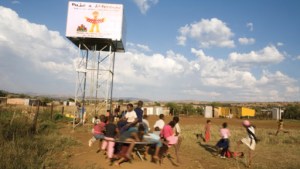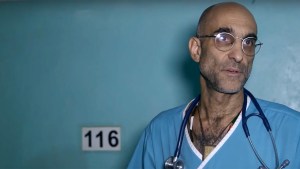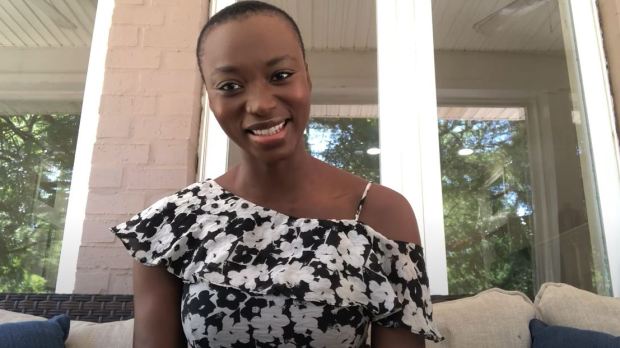As a young child, Georgie Badiel had to get up before dawn every day to walk to the nearest well. Carrying an empty container on her head, she walked three hours round trip every day, with her grandmother and female cousins. As she walked, she felt the injustice of the situation burning inside her.
Badiel has come a long way since then. She’s now a renowned supermodel, and she’s on a mission to help the people in her homeland access clean water more easily.
Born February 7, 1985, in Ivory Coast, Badiel grew up between there and Burkina Faso. Once she achieved success, she went back to her native village in Burkina Faso to help.
The problem wasn’t just in her hometown. Millions of people in Burkina Faso lack clean, accessible drinking water.
Women and girls are in charge of these long, dangerous, exhausting daily journeys to procure this precious commodity. Once collected, it cannot be drunk immediately, because it is full of dangerous bacteria; it must be boiled and left to cool. Almost entire lives are immolated to this work, with the same routine every day.
https://www.instagram.com/p/CGOLAFCHffC/
The website of Ms. Badiel’s foundation describes her frustration with the situation even as a young girl:
Her brothers and male cousins were allowed to sleep while her and the other girls in the house had to go fetch the water. Georgie had a hard time accepting this gender inequality. At night, before going to bed, Georgie would ask her grandmother, “Why is the water so far? Why do we have to boil the water before we drink it?” Her grandmother replied that Georgie asked too many questions.
She lives and works in New York now, but she hasn’t forgotten where she came from. Badiel refuses to resign herself to leaving things as they are.
How is it possible that she can take a long, hot, clean shower in her Manhattan apartment, while her aunts, cousins, nieces, sisters, friends and countless others in West African countries can’t even dream of it?
The beginning of the enterprise
The turning point in this story was the birth of a baby. Georgie tells Italian paper Corriere della Sera that five years ago she flew from the USA to Benin to visit her pregnant sister.
Things there were not at all different from how she had experienced them years before. Her sister had to wake up before dawn to go fill buckets with water. Some women who lived in the countryside had to walk as far as six hours, and face the risk of assault from men and wild animals.
Not just giving, but teaching
She saw this as an unacceptable situation. Georgie wanted to do something about it in an intelligent and forward-thinking way, to be an example of true female empowerment.
After exploring various avenues to bring fresh water to homes and villages in Burkina Faso, and running into numerous obstacles, she started her own foundation. It’s not just about digging wells. It’s also about sanitation, education, and empowering women to be agents of change.
According to the foundation’s website, they’ve educated more than 15,000 children about basic hygiene and sanitary practices, have restored 110 wells and built 19 others—helping more than 270,000 people have access to clean drinking water. They’ve also empowered 118 women to help their communities by training them to restore and maintain wells.
As both a fundraiser and a teaching tool, Badiel has participated in having her story turned into a children’s book, The Water Princess:
For Badiel, access to water is about more than health and physical sustenance; it’s about freedom. In an interview on the program “Course Correction,” hosted by Nelufar Hedayat, she said, “Water enslaves people because they have no choice.” Without water, “there’s no freedom. You can’t go to school… Woman don’t have that freedom to have the possibility to do other things for themselves and for their children.”
This is why the supermodel defends water as a human right.
In the interview, she goes on to say:
You know, every time I go back home—all I’m thinking and all I’m seeing is how can I do more. It’s never enough, whatever I do… Now when I go to Burkina Faso, all I want to do is to find the solution [for] how we can bring clean drinking water to my country. Because when I go to villages, I see women like me, I see young girls like me, that have to spend three hours, four hours—some of them sleep on the road, just to bring back a bucket of water for their family. You know, if we really want to solve poverty, we need to start from the basic. And to me the basic is water. This is where life starts.
Corriere della Sera puts it bluntly:
There is no future for a Burkinabe. Even less so for a woman who is not called Georgie, is not 1.80 meters (5’9”) tall, has not won Miss Africa or does not work for large supermodel agencies such as Elite: “The only prospect for an African is to walk. And carry water. I have never accepted that for myself. And I will never accept it for all the others.”
It is indeed not acceptable, and on “Course Correction,” Badiel calls for “every human being, to use a sense of compassion. To give back. To help someone have the most basic human need, clean drinking water. Because water is everything.”
Without water, one cannot live
An Italian saint and mystic of the 17th century, the great St. Veronica Giuliani, would agree with Badiel. When Veronica was appointed abbess, she designed and built a system of pipes for her sisters, whom she had seen climbing up and down the stairs with buckets full of water, to distribute water effortlessly throughout the monastery.
Famous for her intense and unprecedented mystical experiences and the many special gifts she received from our Lord, she never lost her practical sense and educated her sisters with balance. We can entrust the thirst of Africa to this great patron.
Her patronage is especially fitting since she understands the Living Water that only Christ can give. In addition to physical thirst, she would be the best master builder to build wells that draw on this water, that truly quenches the hearts of every man and woman.

Read more:
Western Foundations Use Child Labor to Pump Water in Africa with “Play Pumps”

Read more:
St. Francis inspires American doctor to work in remote Sudan

